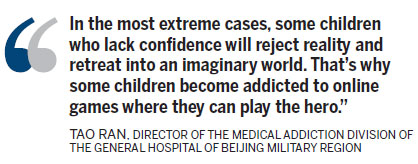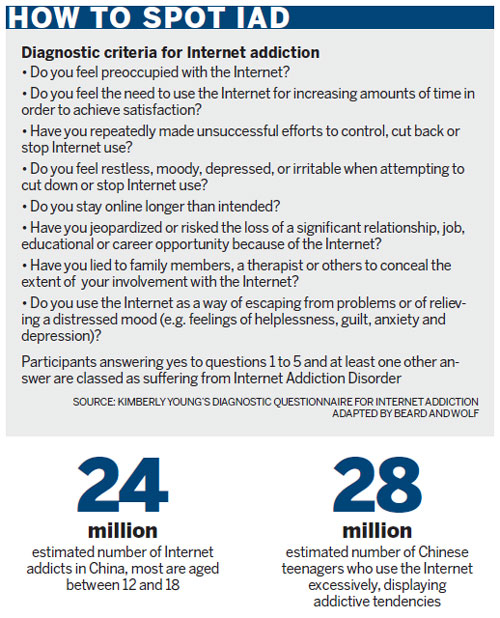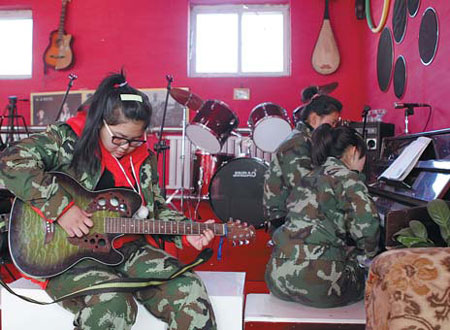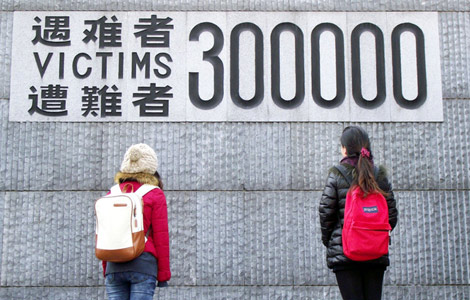Breaking the web of Internet addiction
Updated: 2013-12-13 06:59
By Yang Yang (China Daily USA)
|
||||||||
Millions of teenagers caught in web of compulsive online game playing, Yang Yang reports in Beijing.
On an early November morning, 18-year-old Cheng Hang and his mother stepped down from the train into the cold Beijing air after traveling more than 800 kilometers overnight to the capital.
It was the third time they had visited the city in six months from Huai'an, Jiangsu province, traveling to hospitals they hoped would be able to cure Cheng's "disease".
This time around, they went to the Medical Addiction Division of the General Hospital of Beijing Military Region, which houses a center for Internet Addiction Disorders, known to experts as IAD.
Roughly 95 percent of the center's patients are addicted to online games. The regime is tough. Part of the treatment is based on military training techniques, which means the addicts rise at 6 am and spend an hour forming rows, standing to attention and marching.
"During the past year, we have been seeing doctors in Huai'an and nearby cities. Different doctors gave different diagnoses. Some prescribed antidepressants, while others insisted that my son is completely normal. But he often has headaches and can't stop himself from playing computer games," said Cheng's mother.
The young man, dressed entirely in black, said nothing for a long time. He stood in the corner of the hospital office and stared vacantly at his mother as she related the story.
When he eventually spoke, Cheng, who should have been preparing for the national college entrance exam in June, explained his problem self-consciously and briefly. He first became addicted to computer games almost two years ago after flopping a math test.
"I scored zero. I dared not tell my parents. But I was so frustrated and disappointed. So I went to an Internet bar with some classmates, kind of abandoning myself to computer games," he said. Gradually, he stopped going to school and spent days and nights at Internet bars, causing his parents great anxiety.
Cheng is one of 70 IAD patients at the hospital. China has 24 million Internet addicts, most are aged between 12 and 18, according to Tao Ran, the director of the medical addiction department, one of 40 specialist institutions offering help and treatment for the condition. A further 28 million Chinese teenagers use the Internet excessively and display addictive tendencies, he said.
Almost all the addictions are related to computer games, especially those played online. Experts say the condition can often be ascribed to an inappropriate family environment - where parents are excessively strict, or conversely not strict enough - and the heavy social pressures heaped on young people.
Groundbreaking discovery
Psychiatrists worldwide have long debated the status of Internet addiction and questioned whether it can be classified as a mental disorder. Earlier this year, the American Psychiatric Association included Internet Use Disorder in the fifth edition of its Diagnostic and Statistical Manual of Mental Disorders: "Internet Use Disorder is currently proposed for inclusion in Section 3, an area of DSM-5 for conditions requiring further study before they should be considered disorders," according to the association.
In January 2012, a research team led by Lei Hao of the Wuhan Institute of Physics and Mathematics of the Chinese Academy of Sciences in Hubei province, scanned the brains of 35 males and females aged between 14 and 21. Seventeen of the subjects were addicted to the Internet. The scans revealed that the changes in the white and grey matter in the brains of Internet addicts are similar to those displayed by drug addicts. It was a groundbreaking discovery in the study of IAD.
"We suspect that the changes may affect the addicts' behavior. For example, they are unable to control themselves and act on impulse. Many know it's wrong to miss school to play online games but they just can't control themselves. At the moment, though that just a hypothesis," said Lei.
The team plans to continue the research by collecting at least 30 brain scan samples from among Tao's patients to see if they will indicate changes in the brain before and after treatment.
"We want to find out whether Internet addiction changes the structure of the brain. If that's actually the case, our study will provide solid evidence for the diagnosis and treatment assessment for IAD," said Lei.
Internationally acknowledged methods of diagnosing IAD are now widely used. Depression is seen as a key indicator. Many addicts are depressed and anxious, and are unable or unwilling to communicate meaningfully with other people, including their parents.
One frequently asked question is whether depression leads to Internet addiction or vice versa. There is no definite answer, but based on his 10-year experience at the hospital, Tao believes that two thirds of the patients suffer from depression initially and their Internet addiction exacerbates the condition.
Poor self image
Beijing Qide Education Center, a 60-minute drive from the capital's downtown, is home to 70 "problem teenagers" from a number of provinces. Their bad behavior had prompted their parents to take desperate action. Roughly 70 percent of them use the Internet excessively.
Liu Ran, from the Inner Mongolia autonomous region, looks like a typical Chinese school kid. A conspicuous green hairpin holds her fringe in place, exposing her forehead, but she wears the rest of her hair in a high ponytail.
But, whenever she thinks people are looking at her, she tries to cover her forehead and eyes with her hand, even though the teachers keep telling her not to.
"I think I am too ugly to let people see my face. Before I came here, my fringe hid my eyes completely. Whenever I walked toward a group of people, I thought they were staring and laughing at me, and disliked me. I wished I could dig a hole in the ground and hide," she said.
Liu is one of the most talented students at the center. She excels at painting and is extremely interested in learning to playing the piano. At one point, she sat down at the instrument in the center's music room and hesitantly picked out the beginning of Beethoven's Fur Elise.
"I can barely remember the score because I only studied it for a few days and it's really a long time since I touched the keys," she said, before turning to the music teacher and begging, "Please, Mr Gan, teach me how to play the piano, because it has been my dream since I was small."
Liu's mother, a teacher, sent her to the center because the 16-year-old often pretended to be sick and eventually stopped going to school altogether. She became addicted to an online racing game QQ Fly Car, and, over a period of 20 days, asked her parents for more than 4,000 yuan ($660) to spend on fancy clothes, accessories and makeup for her online avatar. Her excellent skills as an online racer and attractive online appearance soon won her many cyber admirers.
"They told me that I was beautiful and awesome and they loved me," she said, "I felt so satisfied and happy because I was being praised and loved. If my parents refused to give me money, I would fight with them."
The senior middle school student should be preparing for her high school entrance exam, but she stopped going to school because she had no friends there. Last semester, her mother transferred Liu to her own class so that she could supervise her studies more closely.
"If I napped in class, she just came by and slapped my head in front of the whole class, leaving me with no dignity at all. The only friend I had disowned me because she was worried the other kids would think she was pretending to be close to me to gain preferential treatment from my mother. Why would I stay at school when I had no friends there?" Liu asked.
Matters were made worse when Liu's mother insisted that she attended an after-school learning center at the weekends and during the holidays. The daily schedule covered all the major subjects featured in the high school exam: Chinese, mathematics, physics, English and chemistry. "It was suffocating," said Liu, "because of that, I had to give up piano."
Guo Xianghe, the psychological counselor at the Qide center, said many of the students simply lack familial love.
"In these cases, children look for comfort elsewhere. Online, they can be very popular, but in reality, they are lonely," she said. "More than 30 percent of the children here come from single-parent families. Their parents have either divorced or separated."
Tao said IAD in children is usually the result of two distinct types of family environment: parent-oriented, where the parents are very strict and demanding, or child-oriented, where spoiled offspring rule the roost.
"About 70 percent of the teenagers we receive have extremely assertive and aggressive parents - especially the mothers, who control everything about the child: clothing, food, study and friends. By contrast, the other 30 percent are spoiled by their parents and grandparents, who do not discipline them at all," he said.
The children of over-assertive parents lack self-confidence because they are constantly criticized, a situation that's made worse if they perform poorly at school. These kids are not the teachers' favorites and they tend to be withdrawn and uncommunicative because they despise themselves. That usually means that they have no friends and are therefore more susceptible to depression, he said.
Reality gap
It is internationally acknowledged that children aged around 16 are prone to depression, because at that age they have come to understand the gap between childhood dreams and adult reality, but are temporarily unable to do anything about it, said Tao. He added that 48 percent of his patients are high school students, 20 percent are college students and the rest are at middle school. The youngest is an 8-year-old, whose "nanny" was a series of computer games.
"When they're young, children are encouraged by their parents and teachers to build up rosy future dreams, such as becoming a great scientist or a hero in another profession. But for some, their poor performance at school is disappointing and frustrating. In the most extreme cases, some children who lack confidence will reject reality and retreat into an imaginary world," he said.
"That's why some children become addicted to online games where they can play the hero. Others read fantasies in which they can imagine themselves to be the hero," he said. "Once they are separated from the games or fantasies, they feel depressed and anxious."
Cheng Hang loves reading comic books and playing computer games based on the stories about Three Kingdoms (AD 220-280), his favorite period in Chinese history.
Before 2008, Tao's center offered one-on-one treatment, but follow-up research found a failure rate of 70 percent once the patients had left the hospital. Since then, the center has organized group treatment sessions, in which eight to 12 patients form a small class for lessons, including growth education. The patients also share and analyze each other's stories.

The recovery rate gradually improved, rising to 50 percent, and in 2009 the center introduced the concept of "companion parents", where the parents stay with their children as a form of comfort. That saw the recovery rate rise as high as 75 or 80 percent. Parents also take lessons in educating their children.
In September, Bradford Regional Medical Center in Pennsylvania launched the United States' first hospital-based Internet addiction treatment and recovery program. Kimberly Young, the program director, has been studying Internet addiction since 1995. In an e-mail response to questions from China Daily, she wrote, "We in the US now offer the same type of clinical services offered in China.
"Our program is a 10-day inpatient regime that can be expanded to 21 days, depending on the needs of the patient. It is a dual-diagnosis clinic, so people must have a second disorder such as depression or anxiety, and it is based on my model Cognitive-Behavioral Therapy for Internet Addiction."
Young's CBT-IA model has proved extremely successful and variations of it are now used in addiction centers around the world. The difference is that instead of the quasi-military training used at Tao's center, addicts in Germany take on part-time jobs, while in other countries they raise animals, for example, dogs in Japan and horses in South Korea.
"We don't have enough space to keep pets, but military training provides the patients with a routine, getting up at 6 am and going to bed at 9 pm, which is similar to keeping pets," said Tao.
After meeting Tao at the center, Cheng and his mother decided to stay and undergo a six-month course, which costs 8,400 yuan a month for treatment plus 900 yuan for living expenses. Parents are allowed to stay with their children free of charge.
"My son always retreats when faced with difficulties. I regret that I was too strict with him when he was little. I don't know if the treatment will work, but I can't give up on him," said Cheng's mother.
Contact the author at: yangyangs@chinadaily.com.cn
|
Educators use music to help children kick their addiction to the Internet at Beijing Qide Education Center. China has 24 million Internet addicts, and most are aged between 12 and 18. Zou Hong / China Daily |
|
Seventy 'problem teenagers' receive special treatment at Beijing Qide Education Center, where they hope to find a cure for their addiction to the Internet. From left to right: Playing basketball on campus. Students take turns to prepare three meals a day, which is considered an important part of the treatment. Addicts attend a Chinese culture class. Below: A group of teenagers undertake military-style training during their course of treatment. Photos by Zou Hong / China Daily |


(China Daily USA 12/13/2013 page5)
Most Viewed
Editor's Picks

|

|

|

|

|

|
Today's Top News
Wuhan gets tourism plug
Foreigners stay cool to insurance
DPRK's Jang Song-thaek sentenced to death
Chinese Fulbrights 'internationalize' campuses
Sinopec's front woman in the US
Slowdown seen in petroleum use
China,US consider the other side a rival
China's publishing of data welcomed
US Weekly

|

|
















